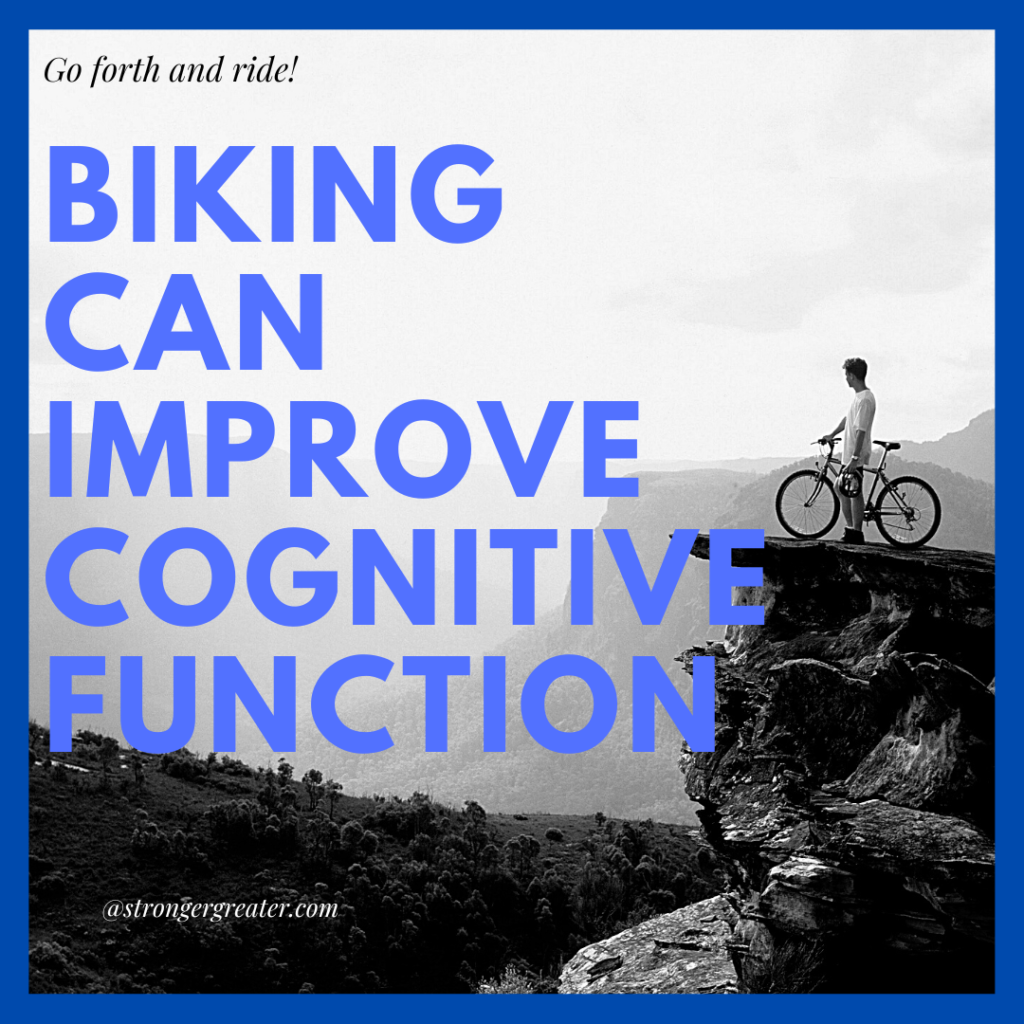
Biking Can Help Reduce Cognitive Decline
By Tellis Everett, Founder of strongerGREATER, Certified Personal Trainer, National Council on Strength and Fitness(NCSF)
“Life is really simple, but we insist on making it complicated.” – Confucius
Studies have shown that engaging in a program of regular exercise improved cognitive function in people who already had memory problems. Exercise may be particularly advantageous for people who carry the APOE4 gene variant, which makes people more susceptible to Alzheimer’s.
There is a growing body of research that suggests that regular exercise, particularly endurance exercise, can help reduce the risk of Alzheimer’s disease and dementia. A recent study found that endurance exercise can reduce the progression of atrophy in a part of the brain associated with memory among people at risk of Alzheimer’s disease. Exercise can improve blood vessel health and boost the production of compounds that support developing brain neurons.
Exercise reduces cognitive decline
The researchers found that both the cycling group and the stretching or range of motion group scored significantly better than would have been predicted if they had continued with treatment as normal.
In one study, researchers at UT Southwestern Medical Center compared cognitive function and brain volume in 70 sedentary, older adults with memory issues and mild cognitive impairment. They separated them into two groups, one doing aerobic exercise and the other concentrating on stretching. The dose of aerobic training was based on each individual’s fitness level, assessed with VO2 testing. By week 26, they were doing four to five sessions per week for about 40 minutes per time, at 85 to 90 percent of max heart rate for the workout. At the end of a year, both groups showed evidence of slightly improved neuropsychological scores, and scored about the same on cognitive tests. Memory and executive function—which includes things like reasoning and problem-solving skills—also improved for all participants. But when the researchers looked at how the buildup changed of amyloid—a type of plaque that’s considered a hallmark of Alzheimer’s and dementia because it destroys neurons in the brain—they saw some important differences: Those in the exercise group who had amyloid buildup at the start of the study experienced slightly less volume reduction in their hippocampus—the part of the brain involved in memory—compared to those in the stretching group.
While there’s currently no treatment that can prevent or cure dementia, researchers have identified exercise and some other factors that may help protect you from cognitive decline. The following are some other factors to consider to help you protect yourself.
Mediterranean diet
The Mediterranean diet emphasizes fruits, vegetables, whole grains, beans, nuts and seeds, and olive oil. Includes moderate amounts of fish, poultry, and dairy products, while limiting red meat. The Mediterranean diet has long been recognized as promoting better cardiovascular health ,lowering the risk of certain cancers, and may protect against cognitive decline. The Mediterranean diet also seems to lower the risk of developing MCI and slow the progression to dementia in people who have the condition.
Alcohol
Studies suggest that people who consume an average of one alcoholic beverage per day may have a lower risk of dementia. However, experts do not recommend drinking alcohol to prevent cognitive decline. If you enjoy an occasional alcoholic beverage, you should limit your consumption to no more one drink per day.
Sleep
Consistent, good-quality sleep is known to improve overall health and may prevent cognitive decline. Our bodies rely on consistent regular sleep for a variety of essential functions, many of them in the brain. Studies have shown that people who regularly sleep less than the recommended seven to eight hours a night score lower on tests of mental function. This may be because learning and memories are consolidated during sleep.
Mental stimulation
In one study, mentally intact people in their 70s and 80s were asked how often they did six activities that required active mental engagement—reading, writing, doing crossword puzzles, playing board or card games, engaging in group discussions, and playing music. In the following five years, those who placed in the highest third in terms of how often they engaged in mentally
stimulating activities were half as likely to develop mild cognitive impairment as those in the lowest third. An earlier report found a similar link between brain-stretching activities and a lower risk of Alzheimer’s. Stay mentally active!
Social Interactions
Social interaction has profound effects on your health and longevity. Social interactions can help protect your memory and cognitive function in several ways as you age. Studies show that people with strong social ties are less likely to experience cognitive declines than those who are alone. By contrast, depression, which often goes hand in hand with loneliness, correlates to faster cognitive decline. In addition, having a strong network of people who support and care for you can help lower your stress levels. Social activities require you to engage several important mental processes, including attention and memory, which can bolster cognition. Frequent engagement helps strengthen neural networks, slowing normal age-related declines. It may also help strengthen cognitive reserve, which can delay the onset of dementia.
In conclusion, while there is no cure for Alzheimer’s disease, regular exercise, particularly endurance exercise and a few lifestyle changes can help reduce the risk of Alzheimer’s disease and dementia.
~strongerGREATER
Tellis Everett is a Certified Personal Trainer that has been helping individuals and families reach their health and fitness goals for over fifteen years. His personal mission is to help others become stronger so that they can live a greater quality of life.